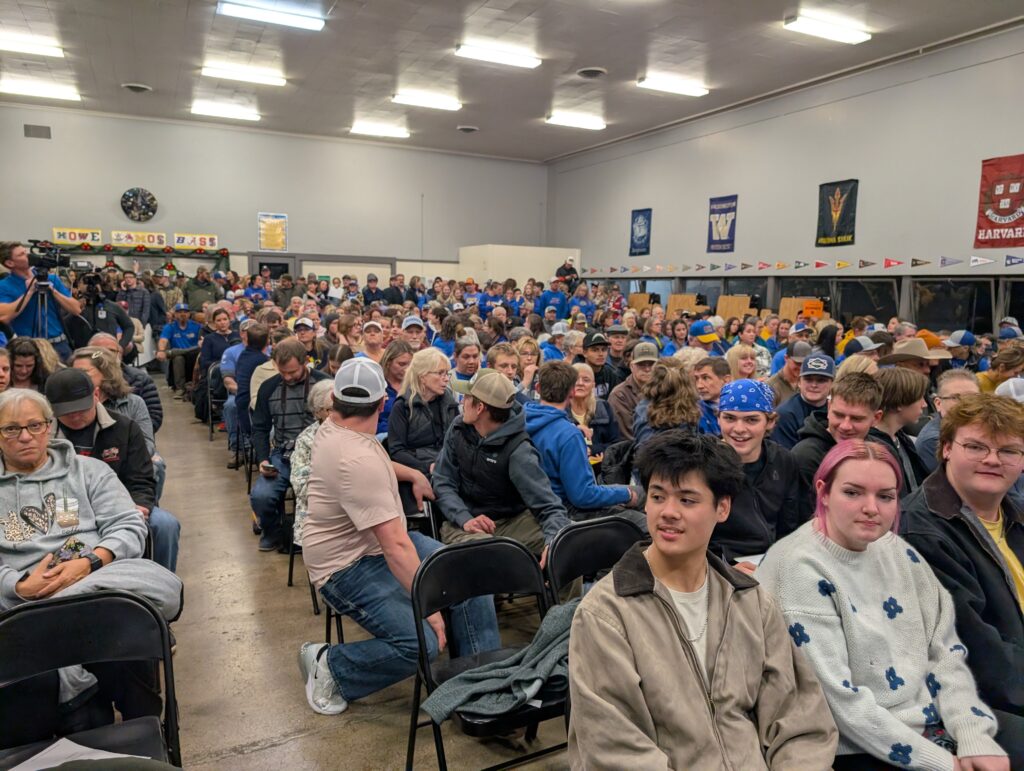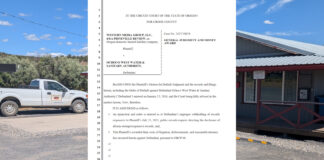
Prineville, Ore. – The Crook County School District Board voted Monday night during a special meeting not to accept review of an appeal of an earlier complaint that was made against Athletic Director Rob Bonner. The decision was followed with a wave of cheers and celebrations by a packed room students, parents, and other community members who came out in support of Bonner.
Earlier in the day, student’s had also staged a historic walkout which had only started to be organized Sunday evening, walking to Pioneer Park in downtown Prineville, followed by a walk down 3rd Street to the school district’s office.
During an impromptu news conference with reporters from the Prineville Review, Central Oregon Daily, and KTVZ, the district’s new communications director, Rich Simmons, who was on his first day on the job, had also acknowledged the right of students to hold the walkout and protest against the district.
“As far as students going out there, this is a part of our democratic society. It’s their constitutional right. It’s their free speech. They did it from what we saw in a respectful positive manner,” Simons said.
The decision by the district came after the Prineville Review uncovered last week that the school board violated Bonner’s rights under Oregon’s public meetings law when it held an original executive session on Dec. 9th when conducted deliberations as part of deciding to accept an appeal filed by a parent regarding a dismissed complaint. While the details are unclear, according to multiple sources, the complaint reportedly was made about Bonner’s alleged handling of a prior investigation into volleyball coach last year which was prompted by a complaint from the same parent.
Under Oregon law (ORS 192.660), Bonner was entitled to be informed of the meeting in advance and provided the opportunity to require the elected board hold its review in a public meeting instead of behind closed doors.
After the Prineville Review questioned the school board about the suspected violation, responses from board members (and later by Bonner himself) revealed that he was not provided written notice or the opportunity to require an open meeting, as required by Oregon’s public meetings law.
The board then moved quickly to reschedule the executive session for the following Monday, Dec. 16th, that time providing Bonner the written notice. Despite the move to correct the mistake, Board Chair Jennifer Knight and Vice Chair Scott Cooper told the Prineville Review by email that some executive sessions held under ORS 192.660(2)(b) (which are to consider the dismissal or disciplining of, or to hear complaints or charges brought against a public official), did not require providing notice to the official the complaint is against.
However, the Executive Director of the Oregon Government Ethics Commission later disputed such a claim, confirming that there were no exceptions under (2)(b) executive sessions.
Yesterday morning, the board was then forced to cancel the executive session and move the deliberations on the complaint to an open meeting after Bonner did in-fact move require the board hold its review in public after receiving the required written notice this time around.
Not only did the board vote not to consider moving forward with the complaint’s appeal, the board avoided even carrying on discussion of the matter, which was in stark contrast to how it handled its original review during last Monday’s illegal executive session where it did discuss the matter.
The board conducted nearly forty minutes of discussion during the previous meeting that did not provide notice to Bonner that he could require the board to hold its deliberations in an open meeting.
While the public is excluded from an executive session, Oregon law requires members of the news media be allowed in executive session in order to fulfill a fundamental democratic role as government watchdogs.
The discovery with the school board is also only one of many illegal or questionable executive sessions by public bodies that a wider Prineville Review investigation has uncovered since July. Another subject of the wider investigation included the Crook County Cemetery District — which has expanded to multiple civil lawsuits (one by this reporter and another by the district’s former manager) and an ongoing Oregon Government Ethics Investigation (OGEC) into one current and one now-former board member.
Prior to the start of the public meeting yesterday evening (Dec. 16th), Bonner entered the room to a thunderous applause and chants of support. The meeting drew crowds that had packed the room, hallways, and even out the doors of the middle school. The record attendance delayed the meeting so staff could setup an overthrow seating in the gymnasium with a video feed.
The board’s decision to avoid any public discussion after being forced into a open session, caused audience to turn from cheers to booing and shouting for the apparent move to shrink amid being forced to provide transparency amid public scrutiny.
The board stated it was not legally allowed to discuss the nature of the complaint during the public session in an effort to explain why it held no discussion regarding the complaint. By Bonner moving to require the board to hold the public session in lieu of the executive session — the board was actually permitted by to address the matter during the open session. In this case, the board simply avoided undertaking the conversation it had previously during the improper executive session.

“Madam chairman, these folks came here tonight because they have a very specific conversation they want to have with us, and unfortunately the legal system doesn’t allow us to have that conversation, and it is also unfortunately true that the way the system works, the superintendent has total control of the assignment of personnel to jobs and the ability to hire and fire,” said Cooper. “The board cannot direct the superintendent on personnel matters.”
Cooper then, to the surprise of many, made a motion to also request that Superintendent Melissa Skinner retain Bonner as the athletic director.
“I move that the board request that the superintendent retain the services of Rob Bonner as athletic director,” Cooper said, prompting a long thunderous applause. The motion received a second by Director Cheyenne Edgerly, followed by all four directors voting in favor.
Many were also shouting calls for the board take action to “fire” or hold a “vote of no confidence” against Dr. Melissa Skinner, the district’s superintendent, as well as one individual calling for the firing of Skinner’s husband who also reportedly works for the district. Others also called for replacing the entire school board.
Skinner was absent at the meeting and out-of-state attending to a death in the family. Earlier in the day staff at the district office told the Prineville Review and other media that Skinner was unavailable in meetings, but Simmons, the district’s spokesperson, later revealed that she was out-of-state handling a family emergency.
Following the meeting, Bonner agreed to a joint interview with the Prineville Review and Central Oregon Daily News, where he went on to confirm that he was in fact never provided written notice to the earlier executive session.
Bonner expressed that he was thankful when the board voted not only to consider reviewing the complaint at the board level, but to also recommend the superintendent retain his services as athletic director.
“I’m very thankful for that. Again, I’m concerned with how we got here — how we got to this point,” Bonner said.
“I want to thank them for the support of, but I want to thank them for the support of our administrators and our teachers,” he said.
We asked Bonner about what motivated him to require the school board to handle his case in a public session in lieu of an executive session, especially after learning that the board denied him the right previously.
“Well I think I would do that every time if this were to happen, I don’t want people talking about me or discussing me unless I’m in the room, and that’s the same for everybody,” Bonner explained.
“If someone has a question of me I would like to set their mind at ease — I’d like to let them know exactly what I did. I’m not somebody who’s going to run from mistakes that I may make — and the reverse is true if I don’t make a mistake — I want to be able to talk about it.”
Editorial: Prineville Review will release audio from school board’s illegal executive session
We acknowledge the possibility of legal action from the district, particularly given its legal counsel’s previous assertions that recording executive sessions is prohibited. However, while Oregon law typically restricts reporting on the content of executive sessions, it does not prohibit recording such sessions.
Moreover, Oregon law — supported by opinions from the Oregon Attorney General — makes it clear that members of the news media face no legal consequences for reporting on the content of an executive session, even if the session was conducted lawfully. This precedent has allowed journalists throughout Oregon to ensure government accountability when public trust is violated.
With that in mind, we call on the Crook County School Board to undertake a future decision formally declaring that the executive session was improper and that disclosure was in the public interest.
Our decision aligns with journalistic practice when addressing executive sessions held in violation of Oregon law. The absence of penalties for reporting such matters enables the press to fulfill its role as a check on government power.
We believe the public’s right to transparency far outweighs the risks amid the potential of government retaliation. Upholding this principle ensures that we meet our journalistic duty to hold the powerful accountable. As the SPJ Code of Ethics states, journalists have a “special obligation to serve as watchdogs over public affairs and government” and must “seek to ensure that the public’s business is conducted in the open, and that public records are open to all.”
Melinda Thomas, an attorney for the school district with the High Desert Education Service District, previously referenced Oregon’s restrictions on surreptitious recording during executive sessions. However, in July 2023, the 9th Circuit Court of Appeals ruled that Oregon’s surreptitious recording law was unconstitutional under the First Amendment for public recording.
While Oregon’s law was previously an outlier — shared only by Alaska, Kentucky, Massachusetts, and Montana — the 9th Circuit’s decision likely invalidates similar laws in Alaska and Montana, which also fall under its jurisdiction. As a result, only Kentucky and Massachusetts retain comparable laws.
This decision is an undeniably uncomfortable one to make, but necessary to fulfill our obligation to ensure that the rights of Oregonians and Crook County residents are upheld. It reflects our commitment to transparency, accountability, and adherence to the principles of the U.S. and Oregon constitutions.
By exposing violations of public trust, we aim to ensure that local government operates in accordance with the law and in full view of the public it serves.
Our release of the executive session audio recording, made after initial publication, can be found here. Please check back here or our subsequent article providing for the release.
Mr. Alderman is an investigative journalist specializing in government transparency, non-profit accountability, consumer protection, and is a subject matter expert on Oregon’s public records and meetings laws. As a former U.S. Army Military Police Officer, he brings a disciplined investigative approach to his reporting that has frequently exposed ethics violations, financial mismanagement, and transparency failures by public officials and agencies.





